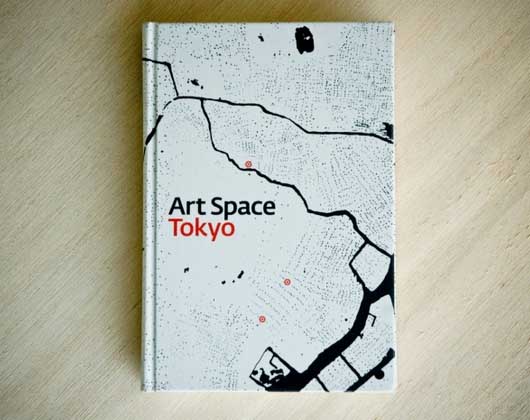Craig Mod has an interesting story about publishing a guide book to the Tokyo art world. Here’s Craig’s description of what happened:
I coauthored and designed a guide book to the Tokyo art world: Art Space Tokyo.
It came out in 2008 to much acclaim and sold out rather quickly.
The publisher we originally published with didn’t have the money to support a reprint. It sat in limbo for ages.
This is a niche book — Tokyo & art.
It’s also a beautiful book: silkscreened clothbound hardcover, detailed maps, printed and bound in Japan. Elegant.

The original publisher was talking about reprinting it — cheaply, paperback, disposable. Destroying much of the original charm.
This is ridiculous. So I bought back worldwide publishing rights from the publisher. Drawing inspiration from REWORK — looking sideways, ignoring the ‘usual’ rules of publishing, this is what’s now happening:
Sales folk at traditional distributors push for cheap cheap cheap because it’s easy to sell. The problem is cheap cheap cheap doesn’t generate sustainable profits. And leads to disposable, flimsy books.
Instead of compromise, we’re raising the price. This lets us keep the same high quality, which readers love. It also means the revenue generated by the sales can lead to expansion of the project. Instead of every sale eeking us back to break-even, every sale helps lay the foundation for expanding the project.
We’re selling direct. No middlemen. This is a niche product — why go through traditional distribution channels that take 50% of the price? Our niche audience can get it direct, online. We’re good at online. This again helps us maximize returns to further invest in the product.
We’re funding through the community on Kickstarter. By keeping our goal high, we know that we’re be able to produce enough books to ensure real returns that can be reinvested for real followup.
Lots of small presses hobble along from release to release, letting sales teams dictate the worth of their books. If we really believe in our products we should be charging what’s necessary to keep things operating. Otherwise, maybe we should rethink our publishing methodologies.
Gina Trapani goes the self-publishing route
Tech writer and coder Gina Trapani always wanted to try self-publishing and writing a book with readers. She recently did just that — here’s Gina’s story:
 Small teams that cut the bullshit and ship a product that works on a short timeline: that’s what 37signals has come to represent to me. So when I wanted to publish a how-to book on a cutting-edge web application that is both delightful and laughably complicated, I decided to follow in 37signals’ footsteps with Getting Real and create that team.
Small teams that cut the bullshit and ship a product that works on a short timeline: that’s what 37signals has come to represent to me. So when I wanted to publish a how-to book on a cutting-edge web application that is both delightful and laughably complicated, I decided to follow in 37signals’ footsteps with Getting Real and create that team.
I turned down a request for a book proposal from a traditional publisher, assembled a small team of six, and self-published the preview edition of the first book on Google Wave in a matter of four weeks. Google Wave is no Basecamp—you need a reference to help you figure out what’s going on there. The Complete Guide to Google Wave is that guide and it’s free to read on the web and available as a PDF and color paperback.
Self-publishing has big advantages over a traditional book deal: notably, total control and timeline you define. Creating this book didn’t involve waiting around to sort out contract drama or fiddling with publisher-supplied Microsoft Word templates. My co-author Adam Pash and I just started writing, and we did it on a public wiki, encouraging and incorporating reader feedback as we worked. We licensed the text under Creative Commons to encourage sharing. For the paperback version of the first edition, we were able to share revenue not with a faceless printer but with a charity in my community who creates taxpayers by creating jobs for developmentally disabled adults.
When you decide to stop hemming and hawing and start shipping, everything changes. While my little indie effort to explain a complicated tech product to humans won’t make the NY Times bestseller list, we created this book this way very much in the spirit of small, independent just-do-it entrepreneurship.

Amber Shah
on 30 Mar 10How refreshing: to have an independent, get-it-done attitude about something as monolithic as publishing. If they can manage to do that for real-world, hold-it-in-your-hand items like a book, then we developers/designers have no excuse to putting our (digital) ideas and wares into the world. Thanks for sharing.
L. Ramoth
on 30 Mar 10Great job! Self publishing is exactly what we did with Fotoblur Magazine. We started the magazine with the idea of a newsstand distribution but had to forgo the option to preserve our artistic vision of releasing a high quality, ad free, and picture book style magazine. With the advent of on-demand-publishing and a lot of help from our photography community we managed to achieve just that.
Dave Kaufman - Techlife
on 30 Mar 10@L Ramoth – I bought a gift subscription to JPG specifically for the magazine to encourage a budding photog to go for it and self publish.
Then JPG ran into financial issue and unlike Craig’s vision didn’t have money to sustain the print even after they were bought.
Is Fotoblur my new gift to photog friends? I love supporting self publishing.
Caspar Chiquet
on 31 Mar 10As far as I know, REWORK used a fairly standard publishing model, that’s why they couldn’t control things such as international Kindle versions. Hope that for their next book, they have enough time to do it the proper 37signals way. ;)
Brett
on 31 Mar 10Craig’s experience reminds me of my first experience with Edward Tufte’s books 10 years ago. Color, fold outs, flaps, etc etc. Great paper, great design. I was blown away by what he was able to do in a book.
No way that could have been published the “traditional” way.
Phil McTimoney
on 31 Mar 10Casper…check out the 37S podcast. They did one about the book, part of which was explaining why they didn’t self-publish.
There’s no formula and nothing is out of bounds, including doing things “traditional” when it makes sense.
nickd
on 31 Mar 10This is going to come off as all “me too,” probably, but here’s my own story about why I decided to go indie and fund my own book through Kickstarter.
I started writing my book without a publisher or a plan. I put together an outline, sent it to a few friends, received feedback, and started the framework for the book. Still no publisher or plan. Wrote 20,000 words. Realized I need a publisher and/or a plan. But writing down all the options, it became clear that it would be fairly hard to find a publisher for this book: it’s similar-ish to a couple of other books, it was (at the time) only halfway done, it would be entirely designed and typeset by myself so that would cut out a couple of middlemen at the publisher level.
And then the more I looked at it, the more I realized that the design of the final book – the actual physical artifact – would become an exemplar of its content. So what “publisher” I would have would simply be an editor, printer (to my specs), and distributor. But then I realized that the editing would have to be implemented, rather than as suggestions, which means I don’t call the shots. Nobody would ever give me a contract that dictated the kind of creative and editorial license that I’m taking, especially considering this is my first book.
So I’m doing it myself. I published the project on Kickstarter last September, and it became fully funded at the end of November. I’m showing the manuscript to many editors, but their edits remain suggestions: I’m the final arbiter of every single word in the thing. I’m designing the entire thing myself. I’m working with the printer myself – and learning more about the process of printing a book than I ever possibly could have if I had a traditional publisher. I’m coordinating with a friend to do the illustrations.
All told, the means of getting a book from my brain to peoples’ hands is far more amenable to the Kickstarter route than the traditional publishing route. Each has its tradeoffs: you certainly work less hard in the traditional route, for example. And you get a professional editor. But along this path of self-publishing I’m continually reminded of how excited I feel to be working on something myself, how the time and logistic constraints force a ton of creative solutions – and having Kickstarter funding automatically guarantees a 250-strong audience. 250 people! It’s ridiculously exciting to connect with folks that way.
This discussion is closed.